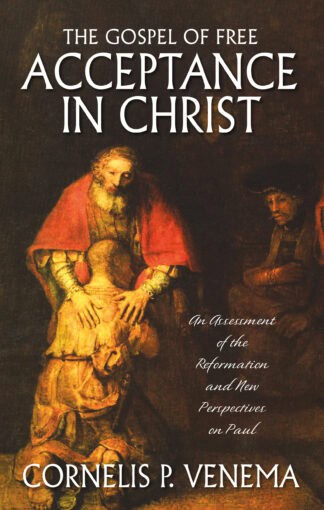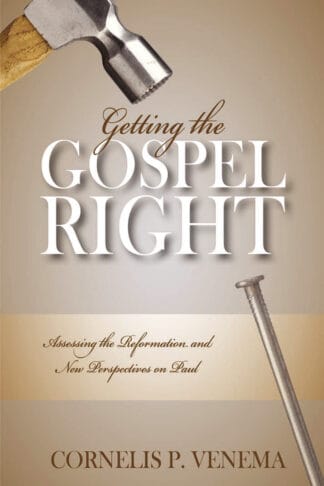The New Perspective on the Apostle Paul
In 1977 the publication of E P Sanders’ book Paul and Palestinian Judaism began a series of publications which radically re-interpreted the gospel, alleging that Paul had misinterpreted the Truth. A ‘New Perspective’ on the background and writings of Paul dominated the mind and writings of influential New Testament scholars. The result was a radical departure from Reformed theology, and a new Paul emerged, quite a different one from the Paul recognised by the church over the last 2,000 years.
The New Perspective (NP), represented by such men as Sanders, J. D. G. Dunn and N. T. Wright in particular, taught that Judaism [which they mistakenly equated with the pure religion of the Old Testament] was not a religion of merit after all, and that the Jews could be saved without having the mediation of the Lord Jesus Christ. The NP also taught that Paul did not actually have a problem with his burden of guilt before his conversion in Acts 9 because [they say] the Jewish sacrifices were not typical but did in themselves literally take away the guilt of sin and confer forgiveness [again, without a Mediator]. The NP writers attempt to create an [invalid] opposition between the faith of Abraham and the faith of the [converted] Paul, denying that both led to the same ‘justification by faith’ [although Paul in Romans equates NT faith with the faith of Abraham in Genesis 15]. They imply that Paul added to the Object of faith, as if Abraham, David etc. did not believe in the same Saviour [who was to come] as did Paul. Dunn’s writings, in particular, give the impression that the Gentiles [under Paul’s influence] should not have attempted to abolish the ‘vain traditions’ of Judaism, but should have embraced them.
Individualistic
The NP also asserts that Paul unduly emphasized the necessity of individual faith for salvation, to the detriment and contradiction of the corporate life of the body of Christ, which they say is the NT emphasis. However, these two lives are not in contradiction, according to the NT. The NT order is that individual saving dependence on Christ is necessary first before the individual can participate in the life of the Christian community. The NP also repeats one of the criticisms launched against Paul almost 2,000 years ago, i.e. that Paul was antinomian in his teaching and that he overemphasized grace to the detriment of works. They use James chapter 2 to allege that other apostles did not agree with his emphasis. No doubt Paul’s doctrine, like all doctrines, can be perverted and abused, but the abuse of NT doctrine does not make it untrue. One can easily see from this why many followers of the NP find that they have so much in common with Roman Catholic doctrine, especially regarding Justification. NP writers allege that Paul had much in common with Marcion, a second century heretic who opposed the OT writings because he thought he saw there a different god from the one portrayed in the NT. NP writers seem to be teaching that salvation in the OT had been by means of the Law and that Paul, by emphasizing Grace, had thus changed the way of salvation. Clearly there is more than a taint of Pelagianism among NP exponents. They do not appear to accept that the Law, as a means of salvation, does indeed contradict salvation by grace alone. Salvation by works was a Judaistic tradition and not the teaching of the OT, which taught salvation by faith alone, as Paul demonstrated in Romans chapter 4 and in Galatians. Moreover, the NT does nowhere teach that grace abolishes our obligation to keep the moral law – Paul himself asserts this in Romans. True faith always seeks sanctification, and grace does not diminish this. The exponents of the NP are confused in their understanding of the purpose of the giving of the law and appear to be satisfied with the formula ‘This do and thou shalt live’ as the means of salvation. This is to forget that the law was given at Sinai to a redeemed people.
Criticise Reformers
This re-writing of the life and teaching of Paul presupposes that this can be done solely by using the methods of modern literary criticism and involves a critical re-editing of the sources. The spiritual presupposition that there is an inspired unity to the NT [having one overall Author] is sadly lacking. The NP writers add to their criticisms, however respectfully, that Luther, Calvin, etc., at the Reformation were led astray by a false understanding of Paul’s writings. N. T. Wright, in particular, suggests that the western world has been led astray in its thinking over the last 500 years because of a mistaken attitude to the Judaistic method of finding favour with God; i.e. the Jews were actually right in thinking that they could find favour with God by their law-keeping. And yet, the Jews [who are not Christians] to this day reject Christ as the divine and only Saviour. To support their thesis, the NP writers re-interpret the phrase ‘the works of the law’ to mean the ‘works’ of the ceremonial law, not the moral law. This, however, contradicts the NT doctrine in Romans, Galatians and Ephesians in particular.
Ecumenical Embarassment
The doctrine of justification by faith alone is an ecumenical embarrassment to the evangelical-liberals nowadays. For example, McGrath, in several of his writings, deliberately blurs the distinction between justification and sanctification, in order to agree with RC statements on alleged doctrinal unity on the doctrine of justification. We cannot agree with McGrath and his confederates that the doctrine of justification ‘needs to be liberated from the forms of theological expression used in the sixteenth century’. Eveson justly comments, ‘His arguments for widening the meaning of justification are unconvincing and his definitions are actually dangerous to the evangelical or gospel truth . . . biblical terms are not like pieces of plastic that can be made to bend at will to suit a particular need’. He is also right in highlighting the danger in these writers prioritising the sinner’s status and acceptance in the church and not firstly before God, ‘. . . and this is again something which Rome finds very acceptable’. The forensic dimension of our relation to God is minimised and also, by consequence, the substitutionary obedience of Christ and the doctrine of imputation.
RCs are happy to agree with ‘justification by faith’, but ‘by faith alone’ continues to bear the anathema of the Papacy. This doctrine continues to be, as Luther said, ‘the article of a standing or a fallen church’. This doctrine will always divide genuine believers from others who rest in some degree upon their works. It is a doctrine which divides, dividing even heaven and hell. Contemporary Jewish scholars still reflect in their writings the pre-conversion theology of Saul of Tarsus, i.e. that Judaism is a religion of merit, of righteousness by human achievement. The NP ‘theologians’ are skilfully advocating a justification based partially upon human works, yet Romans 10:4 shows that there can be no middle ground regarding justification! The NP movement is a revisionist view of history and theology motivated by an unhealthy desire for unbiblical ecumenism. Venema does not exaggerate when he says that ‘At stake is nothing less than the gospel itself’.1
Misinterpreting Judaism
In conclusion, the NP writers assert that Paul misinterpreted contemporary Jewish traditions and practice, and favour a return to Judaism, which ‘was not so bad after all’. They imply that the Apostle’s NT writings were indeed fallible, and therefore not to be trusted. Moreover, Paul is indicted as having led astray the thinking of the religious world by misrepresenting the anti-Christian Jews. The implications of the new doctrines of the NP are far-reaching and they have much in common with the attitudes of liberal higher critics and RC theologians respectively. They cannot be identified as ‘evangelicals’ [with due respect to Thompson] because they support a ‘grace-less moralism’ and minimize the individual’s relation to Christ. Because the NP writers do not wish to be so perceived, they accordingly wish to disguise their threat to the faith. To this end, they use caricatures of Christian doctrine and exaggerate abuses of Christian practice, while adopting a vagueness in defining their terms and re-interpreting Scripture in accordance with prejudice. This approach in seeking to overturn established Christian doctrine is not new; poison mixed with wholesome and healthy food will still kill you in the end. Waters adds two other important criticisms which confirm that we are confronted with another gospel. ‘First, the NPP diminishes sin. According to its view, we are not so fallen that we are unable to contribute to the basis of our justification before God. Second, the NPP diminishes grace. In the NPP, Christ’s work is not so sufficient that we cannot supplement it to be made right with God’. For all that the NPP claims to be ‘new’, it is in fact quite ‘old’. It is a form of the semi-pelagianism that has been with the church for many centuries now.
Notes
The Trust publishes two books by Cornelis Venema on the ‘New Perspective on Paul’:

The Gospel of Free Acceptance in Christ
An Assessment of the Reformation and the New Perspective on Paul
price From: £10.00Description
In 1977 the publication of E P Sanders’ book Paul and Palestinian Judaism began a series of publications which radically re-interpreted the gospel, alleging that Paul had misinterpreted the Truth. A ‘New Perspective’ on the background and writings of Paul dominated the mind and writings of influential New Testament scholars. The result was a radical departure from […]

Getting the Gospel Right
Assessing the Reformation and New Perspectives on Paul
price From: £4.80Description
In 1977 the publication of E P Sanders’ book Paul and Palestinian Judaism began a series of publications which radically re-interpreted the gospel, alleging that Paul had misinterpreted the Truth. A ‘New Perspective’ on the background and writings of Paul dominated the mind and writings of influential New Testament scholars. The result was a radical departure from […]
Taken with permission from Free Church Witness, April 2013 issue. (Note added).
Latest Articles
Neglecting the Soul 26 January 2026
The following article appeared in Issue 491–2 of The Banner of Truth Magazine (August–September 2004). How many times does the Bible tell us to watch our own hearts! Yet how often do Christians slip and fall for want of diligence in this very basic duty! Not for nothing does the Bible say: ‘He that ruleth […]
Developing the Hide of a Rhinoceros 21 January 2026
This article first appeared at The Australian Presbyterian and is featured in Issue 749 of the Banner of Truth Magazine (February 2026). Somewhere, Stuart Briscoe has commented that three attributes of a pastor are needed: ‘The mind of a scholar, the heart of a child, and the hide of a rhinoceros.’ The last attribute seems […]
